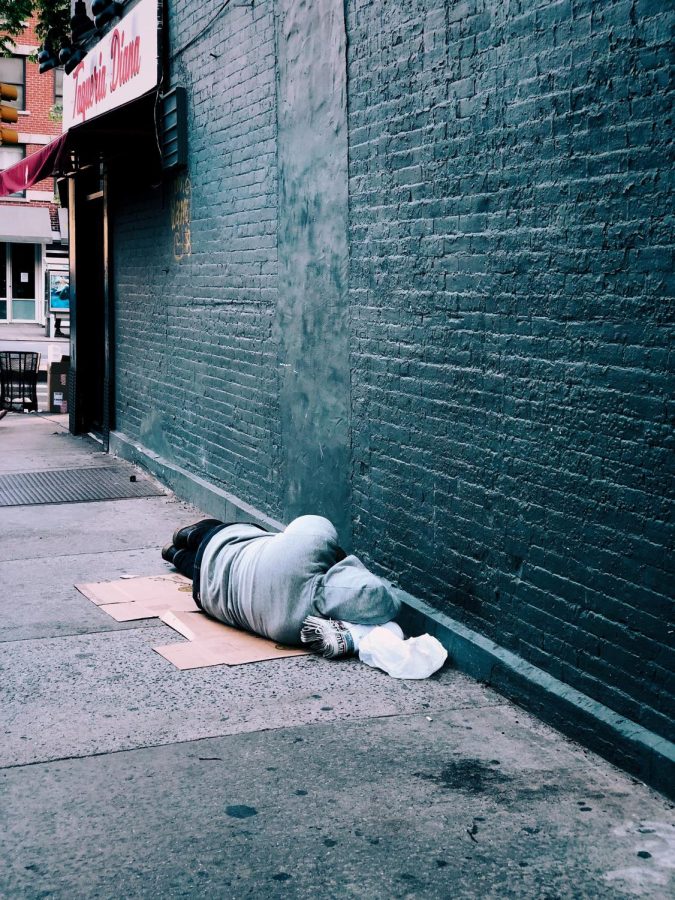Beds 5, 10, 13, and 28 were assigned the dining hall for their bi-weekly chore. Marquis was assigned to the clothing room just as he has been for the past three months.
Marquis, 26 years old, has been diagnosed with paranoid schizophrenia which has caused him a lot of trouble in recent years. At 21, he joined the Army in hopes of making a career out of his service. He was undiagnosed at the time, and an onset of symptoms lead to him getting discharged a week before he finished basic training.
Facing some legal troubles due to the possession of a firearm, Marquis spent 10 and a half months in jail on a sentence of 11-23 months. Coming out of jail, he went in to a recovery house run by a rehabilitation center, called Gaudenzia, but being improperly medicated, Marquis was once again kicked out of a program and found himself homeless.
“Things happen for a reason,” Marquis says.
He has been a resident of St. John’s Hospice for a year and three months now, and he has found his niche helping Ray, Antonio, and Al run the shower program that the facility offers.
St. John’s Hospice is a homeless shelter, located in Philadelphia, which holds 40 residents and offers daily showers and lunches to outsiders. They also run an emergency shelter, the “coffee house,” that takes in up to 27 guys from 10 p.m. – 6 a.m. They feed anywhere from 200-400 men a day during their lunch hour and provide 150 showers a week to homeless men on the streets of Center City.
Residents usually stay at St. John’s anywhere from six months to two years. Some, unfortunately, get kicked out since it is a drug and alcohol free program. The residents are asked to leave from 9-11:30 a.m., and have to be back by their 9:30 p.m. curfew during the week. They get an extended curfew of 11 p.m. on weekends and are granted overnight stays so that they able to spend time with their families and loved ones.
The meals and clothing provided to residents and outsiders are all supplied through donations, most coming from people within local parishes, and even surrounding counties. From breads and cakes from Acme, to name brand clothes from Macy’s and Brooks Brothers, the residents have a variety of choices in their provisions; sometimes too many.
“They get out of pocket,” jokes the supervisor, Ray Binns. He has been working at St. John’s for six years and he oversees the clothing room as a part of their shower program. “Sometimes they act like they’re at Burlington or Marshall’s,” he says.
With the help of the Assistant Supervisor, Antonio Boston, they make sure that these guys get what they need without allowing them to shop for items. “We don’t baby no man,” Antonio says. “We help them,” as he instructs the staff to “push the khakis” instead of catering to individual requests.
Al Stapleton, a regular volunteer, admits that it can be challenging. It took the area guys a little bit of time to realize that he was there to help them and not to hurt them. “They’ve got their own little culture,” he says. He believes that they looked at him as an authoritative figure when he first began volunteering three years ago.
“It shows me how fortunate I am in my life,” says Al. Many of the guys who work and volunteer their services at St. John’s have been through similar rough patches in their own lives. “I decided to ask God where I belong and where I’d be most useful,” says Ray.
Many of the men that rely on St. John’s services have drug and alcohol and/or mental health problems. A lot of them have developed survival skills that make the jobs of staff a little more difficult. “You don’t know what’s on a person’s mind,” says Ray.
“Sometimes they get programmed to tell a believable story,” says Antonio. He tells them, “Just be straight-up and honest.” Although their learned behaviors can be a roadblock, many of the men do progress with the help of staff on hand.
St. John’s offers case management which will help residents obtain transitional housing. Marquis says that his first application for Social Security benefits was denied. It wasn’t until he got help from the case managers at St. John’s that he was able to appeal the decision.
Marquis is “on his way out the door” at St. John’s Hospice because he will soon be receiving his housing voucher. He admits, “This place can get depressing a little bit,” but he will certainly miss all of the friends that he has made in the clothing room.
He has hopes of going to the Community College of Philadelphia where he would like to study music. Marquis says that St. John’s Hospice has made this dream feasible by helping him acquire his Social Security benefits.
In regards to his mental health, Marquis said something that sums up the majority of the people you meet at St. John’s Hospice. “They don’t know the whole picture,” he says.


